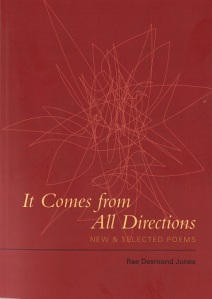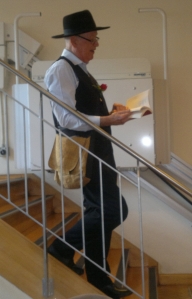
Well firstly, Happy Birthday to Rae. (All sing ‘Happy Birthday’)
Singing to the arid stars!
I’m honoured to have the opportunity to praise this book today – and when Rae asked me to do the honours, it wasn’t so much that I relished getting onto the encomium mill, it was that I thought ‘I get to read lines of Rae’s that I like and I get to read them the way I like’, so that’s what I’ll mainly do.
Rae and I go back a long way; in fact, Rae, I believe, holds the record for holding one of my poems (juvenilia naturally) the longest before publishing (somewhere between five and ten years). I have considered forgiving him – not for holding it but for publishing it – but I’ve thought better of this. The time is not right. We are, after all, both still alive.
So to read a few favourites and favoured fragments. First ‘The Poets’ – words of the seventies as true today as they will be tomorrow.
The Poets
they speak to a vast audience
consisting mainly of one another
all of whom nervously shuffle
manuscripts & wait their turn
meantime the masses who are
as usual blind deaf & stupid
just keep walking to the bus or
into the office reading newspapers
& quite obviously don’t give a fuck,
& who can blame them?
for of course they have real
problems, the problems of carrying
on the business of carefully
& unselfconsciously
living & dying & paying off the
telly getting tired disillusioned
& old but nonetheless keeping
the nose to the grindstone etc.,
but if one should by some incredible
mischance happen to actually read
one of the poems published
as an occasional cultural piece
but not too prominently
in the corner of the review page
of one of our Saturday morning papers,
he nods, baffled, & turns back to
the real problem he has of the second
mortgage or thinks about his wife
swollen with the third
or the legs of the office girl
so tightly clenched he thinks
her pussy must almost pucker &
blow him kisses
but rarely he might think
at how unreal the world has
become & how beautiful & how
soon he must leave it which is
also beautiful & how time
passes but in any case perhaps
just for a minute he thinks
poetry & knows himself
dwarfish, blind & ugly &
returns once again to the real.
Elsewhere Rae tells us the poets are the ones with the little knives hidden in the pages of their manuscripts. Homer, Rae tells us, was this blind old fart wandering about singing and banging on a garbage tin lid. And what is poetry? For Rae, it’s Brecht’s not the mirror held up to reality but the hammer with which to shape reality. Thinking of different realities, of the différend between them, I’d like to read Rae’s ‘Decline and Fall’ – title poem of a recent book and the ultimate high school teacher’s poem, which, Leunig-like, I know, with the aid of magnet, adorned many a teacher’s fridge, especially in the later eighties.
Decline and Fall
i hate them
the truth is out! & they hate me.
them, the barbarians in baseball hats,
twisting in chairs lined up in artificial order,
and carving their loathing on the tabletops.
do you know why the roman empire fell? i ask.
who cares? a boy giggles.
that is the reason, i say.
you are old & fat, they say.
they are young & fat, I don’t say.
because i don’t want them to get healthy.
they can stay ugly and stupid so i can despise them.
why envy the awkward root they didn’t have
or their perfect wet dreams pearling
……….on the television screen?
outside the aluminium rimmed window
a crow strops his beak against a tree trunk
so that it will be sharp to dig
soft white worms from the dark earth.
i yearn for that brutal freedom.
the students resist my will although their heads bow,
broken for a second.
the room constricts us all.
i almost say get out.
go back to your bad videos & your hopeless dreams:
be unemployable.
daub graffiti on trains
& put as many needles in your arms as you want.
die if it seems romantic.
let there be war between us.
Sharks on King Street trawl past indifferent in their steel bodies. In Darlinghurst they tap for ambulances. Now if I were a Summer Hillian I’d be able to wax on about the local content and the post-mayoral revisioning thereof in the Rae oeuvre. In fact I do myself have two Summer Hill connections; one is with the Table Tennis Centre in the early seventies (ah, nobody remembers), the other is with the now IGA supermarket just behind here, the shelves of which I was helping to stack I think in 1979 or 1980, before it first opened, and where I learned a lot from first hand accounts of sexual abuse of students in Hunter Valley schools by Catholic clergy, but that as they say is another story… complete non sequitur in fact, yet part of the temporal fabric we’re tearing through here… One is struck coming here at how much – how unusually much – of this suburb is intact – I mean has not been wrecked by developers and much of this is down to Rae! I mean Mayor Jones. It looks better than it did in 1979 because it’s all been painted and some tiles have been replaced and now there are trees.

Rae Desmond Jones reading from It Comes from All Directions – New and Selected Poems
In Rae’s work there’s frequently the embarrassment of the gritty corporeal and from all directions. You were my first between two fences off a lane in Darlinghurst. From Rae one gets that awkward feeling and that sweet tease built into the hip structure is still effective at 71 and 72 (and beyond?) naked in the dancing synapses of the Rae brain. You (the reader) find yourself preparing to cringe and then you think ‘fuck it, this is real’ because there was a time when I could have been you and I am truly but I’m going there.
I readily admit I haven’t read all of the new poems and that’s because I wanted the pleasure of reading a new poem when I finally got hold of a hard copy of the book in my hands – as in, from this time on. Still, I have read enough to say that in Rae’s book singing to the arid stars turns out to be something we might ourselves not be able to do. After all, we homo sapiens are saps and this lonely night we got it coming. And again, the multiplying universes are happier now because they are recognized as they give birth to subtle gods.
And so it is with pleasure I introduce to you – Mayor Jones, R.D.J., birthday boy, survivor of the siege of Bundanon, sometime acknowledged legislator, now lost somewhere between Parnassus and Helicon, with ever a backward Eurydical glance. When he speaks – a waterfall in sunlight, nothin’ but fire rockin’ in meat. The grim bloke looking anxiously for the tuba – Rae!
- Kit Kelen
———————————————————————————————–
Christopher (Kit) Kelen is a poet, scholar and visual artist, who shuttles between his home at Markwell via Bulahdelah and a position as Professor of English at the University of Macau in south China. Over the last five years Kit has been bringing Chinese poets and translators to Australia to translate Australian poets. So far five large scale anthologies have been published as a result. Over the last twenty years a dozen books of Kit’s poetry have been published in English and volumes of his poetry have also been published in Chinese, Portuguese, Italian, Swedish and Filipino. His next volume of poems Scavenger’s Season will be published by Puncher and Wattman in Australia in 2014.



















